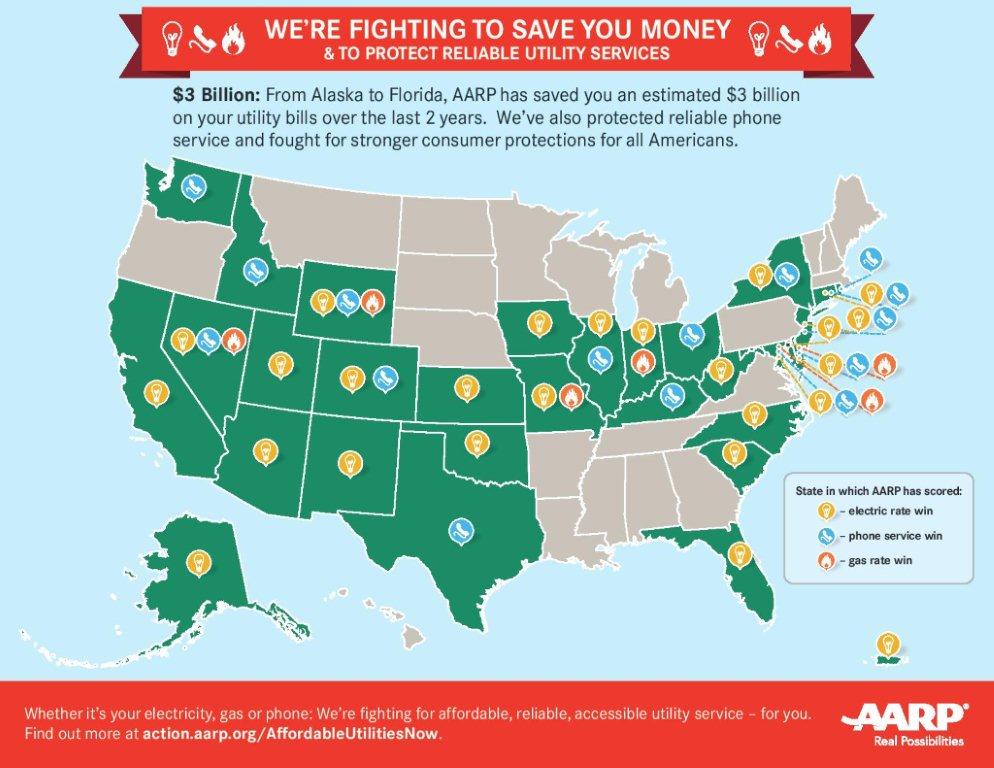AARP Hearing Center

Utility Surcharges
AARP Missouri fought against unreasonable surcharges that would impact a consumer’s pocketbook. Bills introduced early in the session were SB207 that would have expanded the current Infrastructure Surcharge Replacement Surcharge (ISRS) and made it easier for electric utilities to raise rates each and every year. AARP was aggressive in making sure legislators knew how much seniors would be impacted. A group of legislators did something rare by asking if this new surcharge made sense for Missourians, especially seniors on fixed incomes. The legislators were successful at stopping this new surcharge from going on your electric bill; SB207 died.
SB297, another ISRS bill, which would modify provisions related to water utilities, was defeated on third reading in the Senate. The Senate defeated the water utility surcharge by a vote of 16-17. SB297 would have raised utility rates without proper oversight through added surcharges. Defeating this measure was critical not only for water utility ratepayers, but it was considered the easiest of the many ISRS bills for the Senate to pass.
SB240, modified provisions relating to ratemaking for gas corporations, was truly agreed to and finally passed. Before this legislation was passed, the Public Service Commission could not approve infrastructure system replacement surcharges without having issued a rate proceeding decision within the last three years. SB240 calls for modifying provisions to five years. This bill did not pass during the veto session.
Circuit Breaker Funding Survives
The Governor proposed the elimination of the circuit breaker property tax credit in his State of the State Address, impacting 105,000 individuals. The Circuit Breaker provided a credit of approximately $500 per year to low-income seniors and people with disabilities who rent their homes. It was something that brought some relief to basic needs in the everyday lives of this population.
The Governor received a lot of pressure from advocates and therefore, changed his position to eliminate. The Circuit Breaker property tax credit, SB350, was vetoed. Funding earmarked for the elimination of Circuit Breaker would now have to be used for other critical services such as Federally Qualified Health Clinics (FQHCs), First Steps, Medical Assistance for the Blind and other early learning initiatives.
Legislation passed in the final hours of the session patched a hole in the state budget that would transfer $55 million of general revenues into a newly created “Missouri Senior Services Protection Fund” to provide for the programs mentioned above.
No Medicaid Expansion in Missouri
Legislators took a pass on Medicaid Expansion. However, legislation was passed in the final days of the 2013 session to allow for a bill giving legislators the authority to create a Medicaid Expansion Task Force. This authority will continue the discussion of expanding Medicaid for the state’s 260,000 people without insurance coverage and who fall into the income level of 138%, Federal Poverty.
AARP commissioned a 2013 survey of Missouri residents 45 years and older about the importance of Medicaid Expansion and, overwhelmingly, respondents supported expansion.
Voter Identification
For several years, the legislature has introduced bills to require a person to submit a specified form of photo identification. This year’s efforts were no different. HJR5 proposed a constitutional amendment that would be decided by the voters, and HB48 that would require a person to submit photo identification with specified exceptions. Neither of these measures passed in this session.
Tax Cuts
In Missouri’s continuing challenge to “keep pace” with Kansas, a tax cut plan, HB253, was passed. This tax cut would gradually cut personal and corporate income taxes over 10 years and slash taxes on most businesses in half over five years; tax cuts would be about $700 million. The measure would impact funding for other programs and services, such as education and public safety. The tax cuts would also mean people who rely on prescription drugs would see an increase in taxes because their prescription drugs will be taxed. HB253 would cut taxes for profitable corporations and the very wealthiest at the expense of low-income and working Missourians. This bill did not pass during the veto session; the governor’s veto stands.
Affordable Care Act
AARP Missouri is gearing up and working with other advocacy partners to conduct education on the Affordable Care Act (ACA) as the October enrollment approaches. There is still much confusion and misinformation about the ACA. Now that staff and volunteers have returned from AARP regional trainings on the ACA, we are confident that ACA education will get the exposure to correct misinformation and confusion. Missouri will be one of the states that will have a Federally Facilitated Exchange.































































